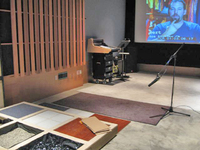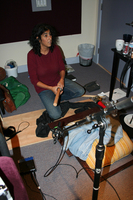 WOODY: When you go to a Foley stage or a session, what items do you anticipate they will have there for you? Obviously you aren't going to be carrying a car door around with you.
WOODY: When you go to a Foley stage or a session, what items do you anticipate they will have there for you? Obviously you aren't going to be carrying a car door around with you.
MONIQUE: Exactly. A car door is important. There was a long time where one of the stages I worked at didn't have a car door and I was trying to use a folding chair. It was terrible. Finally one day one of the sound editors took pity on me and went to "pick-a-part' and bought a car door. A car door is a big one. A wood chair is nice because nothing sounds quite like a wood chair, especially one that has a little bit of creak to it. I prefer not to carry dishes and glassware with me, so it's nice that, even if they don't have a proper Foley stage, usually the places I work will have a kitchen. Nothing is sacred or off limits. I will grab whatever is around the facility. I won't break it or anything (usually).
I'm definitely resourceful and I will find things and use them. Some of the creativity comes from, in my experience, trying to make do. Working at little boutique studios, they don't have everything that one needs, literally. So trying to figure out how to make a wide range of sounds working with very little is, I think, a great part of the creativity. On the other hand, having done this for 11 or 12 years, a lot of times movies have someone riding a horse. Not as much in contemporary films, but I did a lot of old movies where I did the Foley.
And I've always faked it with some cool leather creaks and some belts I use as reins, but the other day I was somewhere that actually had a saddle and I got to use the saddle for the creaks. And it sounded so good, I was like, oh my god, I can't believe I'm finally getting to use this thing! So it would be a luxury to work somewhere that had all sorts of cool things, but it's also honed my creativity to not have that option. If I would have always had the chance to literally use "the thing' then I wouldn't have grown in the way that I have needing to improvise and make do. Also, the literal prop does not always sound the best. It just depends.
There have also been situations where you spend a lot of time compensating for the shortcomings of a room. Say the stage is an ADR stage and there are no Foley pits, there is no dirt or gravel or grass area, you can still make do, as long as you have a decent concrete surface, which can be used for tile, cement, or asphalt. For dirt footsteps, you can throw a carpet down and throw some dirt on the carpet and walk on that but you have to walk much softer so you don't reveal the floor underneath and there are other things you have to do to try to pull that off. You can do it. It doesn't sound as good, but you can get away with just about anything as long as the room is quiet and it doesn't have weird bounce.
I'm not an acoustician, but there have been times that in working in makeshift rooms there's weird bounce that happens from all of the right angles in the walls and the ceiling. I recently worked on a stage like that where I was walking "a big guy' and I was walking really hard and it sounded great to me, but then when I listened to the recording I sounded like a woman in heels. There is just a bizarre, weird, echo bounce thing that can happen which makes things more difficult. So I ended up having to walk this big guy really soft so that we wouldn't hear that [the poor room quality]. It compromises the quality when you don't have a great stage, but we can make do with just about whatever we are given.
WOODY: You do Foley for feature films, but you also do it for television as well?
MONIQUE: Yeah. Because I work at a few different places, I get to work on a really nice variety of projects which I think is helpful as far as one not getting into a bit of a rut. I work on feature length films, good and bad. I work on television. I recently started a really great one-hour drama, "Mad Men." I sometimes get to do animation, which is the most difficult thing I do from a creative standpoint. I work on reality TV, which most people are just amazed that there is Foley in reality TV. That seems to be a huge secret that no one knows. Even people in the industry are shocked when I tell them that I do Foley for reality TV. I've done Foley for "Survivor" for 13 seasons. I am currently working on "American Gladiators" and "Wipe Out." I did Foley for many years for "Fear Factor."
 WOODY: So you're doing the munching of spiders?
WOODY: So you're doing the munching of spiders?
MONIQUE: Yes, yes, yes. People eating intestines and things, the sound of people in a fish tank full of roaches moving about. All of that stuff does not really have a sound associated with it, we put that in. At first when I started "Fear Factor" I was very creeped out by the content and then what I grew to realize is it was one of the most creative things that I'd ever gotten to do from a Foley standpoint because it's not straightforward. It's not setting a wine glass down. There's only so much pizzazz that can have. But having to come up with a way to make the worms sound different than the roaches and the pig intestine chewing sound different than the hundred year old egg involves some true thought. And plus, they actually play the stuff up, which is really nice.
WOODY: That was going to be my next question. Did you find that they use this for the on air mix or is it more for the M&E and foreign delivery.
MONIQUE: For "Fear Factor" it made the mix and it was played up. On "Survivor," they say they use what we do, but the show has such wonderful music, the composer for that is just outstanding. For something like "Survivor' we mainly cover the competitions. So if somebody is going through some sort of obstacle course, that's what we cover. We also cover them traipsing around through the jungle and certain things that didn't come out well in production because they don't mic reality shows for those sounds the way they do when they are shooting in a controlled setting. They mic for dialog, but no one bothers sticking a mic into the tank of cockroaches and I don't even know if they would, what that would sound like.
